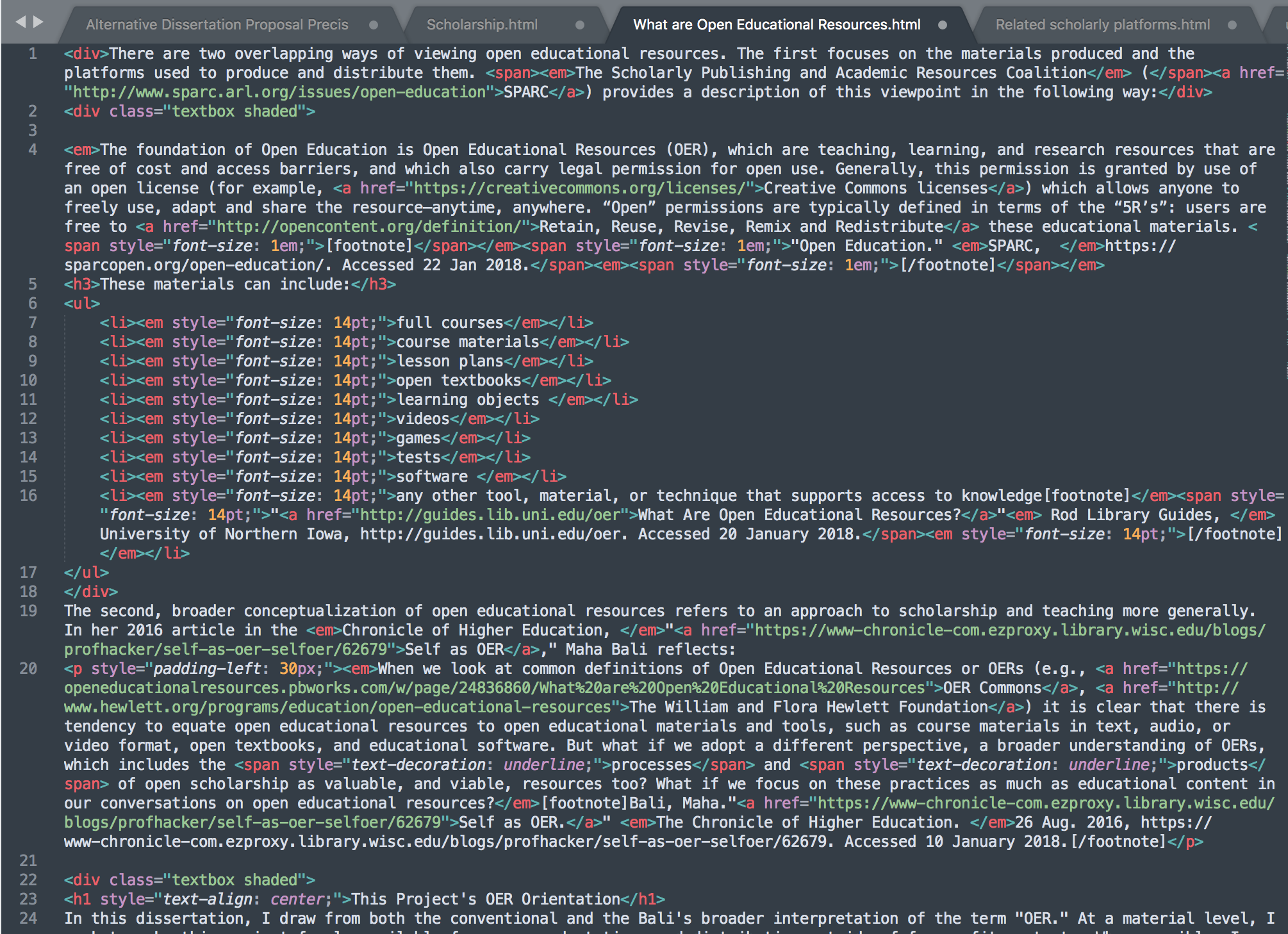Depositing
UW-Madison Records
The University does not provide functional guidance for digital dissertation projects in its Guide to Preparing your Doctoral Dissertation. In response to this, Steel Wagstaff of the English department created an open, web-based dissertation that he also adapted to the ProQuest structure and format, essentially creating two separate versions of his dissertation project.
There is, however, a precedent for submitting alternative dissertation formats at other institutions. For example, one option would be for me to submit text like this as one component of my final project:
Because hyperlinks and interactive media elements connect to my projects central theories, archiving the html code in addition to the English text of my dissertation would preserve an important aspect of my dissertation’s broader intervention.
Pressbooks, the UW-supported tool that I am using to write my dissertation (and to compose this proposal), is a platform that displays texts in three forms. (Its primary use case, indeed, is the production of open textbooks by professors and researchers.) The Pressbooks web format can include interactive elements like videos and H5P quizzes. This tool also supports PDF and EPub exports, which means that I could easily deposit a PDF e-book of my dissertation with links or QR codes linking to the interactive aspects of my project. For this to be possible, UW would first need to accept a slightly different layout for the final PDF document.
Next steps:
The specific submission format for my project bears additional research. I’m looking into how other institutions have worked with this issue. The History department at George Mason University is one example of an institutional center that provides broad guidelines about digital dissertation formats, but like the other precedents I have seen thus far, this resource does not contain details about depositing.
ProQuest Publication
When defending her digital dissertation in 2005, UW-Milwaukee PhD candidate Virginia Kuhn faced some challenges related to the way her project’s emphasis on open-access pedagogy intersected with the corporate institutions that shape the public university. In an AAUP article titled “Embrace and Ambivalence,” Kuhn observes:
“The UWM graduate school representative’s research revealed that filing with ProQuest was only a convention, one based mainly on convenience. It was not meant to serve any validating role.”
ProQuest, the company that archives nearly all dissertations in the United States, will accept compact discs but only if they are submitted in a “standard” format. Unfortunately, these formats are limited to corporate products such as Microsoft Word and Adobe Acrobat. My dissertation was created in TK3, a platform developed by Bob Stein, then a visiting fellow at the University of Southern California. (Stein, who now directs the Institute for the Future of the Book, is committed to the open-source movement.) But since ProQuest would not accept this format, the graduate school had to decide whether the requirement to file with ProQuest could be separated from the doctoral award. The UWM graduate school representative’s research revealed that filing with ProQuest was only a convention, one based mainly on convenience. It was not meant to serve any validating role. After I staunchly refused to submit a printed version of the full dissertation, since it would have invalidated the core argument, the administration agreed to let me provide a compact disc to the university library and submit only an abstract to ProQuest.
Open Question: Is ProQuest the right space to host an open dissertation project?
My dissertation project is invested in the open scholarship and open pedagogy movement. (In this work, I speak at length about the connections between copyright laws in 19th-century Britain and the corporate control over digital archives that we see today.)
As a database that is locked behind a paywall, ProQuest is a resource that is the most accessible to institutions and individuals who have financial means. This is in tension with the philosophies that underpin my dissertation as a whole. ProQuest has recently instated a program that will allow PhD students to pay to make their dissertation open-access. I understand that hosting services cost money and am willing to pay an additional fee in order to present my work in a way that better aligns with my ethical values. However, if I am to pay additional money for this service, I would rather invest that money an organization that isn’t a part of an institutional process I critique in my work.
ProQuest Alternatives at Other Institutions
There’s a much broader international push to support academic publishing and resource hosting that is openly accessible. (The Elsevier controversy provides an example of the energy behind this push.) There is now an Open Repository Conference and a Directory of Open Access Repositories (OpenDOER) to coordinate these efforts.
Influential universities such as Columbia and Duke have also participated in the formation of digital repositories for people in their region or academic consortia. For example, Columbia and its affiliates host Academic Commons, citing many participants’ desire for free public access to their work as one of the benefits of participating in the commons.
Similarly, the Carolina Digital Repository is a resource for members of the academic communities in the vicinity of Chapel Hill. The coordinators cite electronic dissertations as a key component of their archive.
The Digital Commons
Of the ProQuest alternatives, the Digital Commons (BePress) may be the most promising avenue for hosting. The University of Wisconsin-Milwaukee has an existing relationship with the Commons, and in addition to this, the repository coordinators are involved in ongoing discussions and trainings focusing on best practices for hosting electronic theses.
Update: Digital Commons has been purchased by Elsevier, making it a non-starter for this project.


